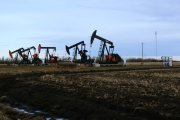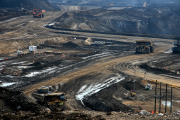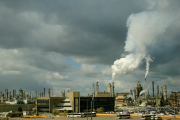$364 billion is no chump change. That’s the amount the Conference Board of Canada predicts will be invested over the next 25 years in Alberta’s oilsands. The Conference Board’s report, Fuel for Thought: The Economic Benefits of the Oilsands for Canada’s Regions, seeks to show just how profitable the oilsands can be for Canada.
In a column published earlier this week, I explained how there are some economic downsides to oilsands expansion that need to be part of the conversation, as well as the upsides.
Today I want to point out the real elephant in the room for any discussion about the oilsands and Canada’s future: climate change. Until we see far stronger government policies to curtail greenhouse gas pollution, oilsands expansion plans simply can’t be reconciled with a responsible Canadian effort to tackle climate change.
To its credit, the Conference Board of Canada does acknowledge that the possibility of stronger action on climate change creates a “downside risk to oil sands investment over the long term.” We at the Pembina Institute wholeheartedly agree.
The status quo in the oilsands is already causing concern among some institutional investors. This month, a group of investors representing $2 trillion in assets wrote a letter to oil sands producers expressing their concern about the sector’s lack of action on reducing greenhouse gas emissions, among other issues.
Does tackling climate change mean the end of the oilsands? Not at all. The International Energy Agency’s 2010 World Energy Outlook modeled a “450 scenario” defined as a future where global energy supply and demand is balanced so that the planet has a 50/50 chance of preventing runaway climate change.
In that future, growth in the oilsands happens more slowly than it would under “business as usual,” but the sector’s production would still nearly double from today’s levels, reaching just over 3 million barrels per day by 2035. (Current unrestrained production forecasts for the oilsands call for around 5 million barrels per day.)
So, according to the International Energy Agency’s analysis, the oilsands could still generate growth and economic benefits even in a scenario where the world (including Canada) takes the steps needed to avoid catastrophic climate change.
Not only that, a more moderate pace of growth increases the likelihood that Canadians can capture more of those economic benefits. As has been demonstrated over the past decade, frenzied growth leads to cost inflation, and those costs are written off before oilsands companies pay taxes and royalties. Further, wage inflation, which expands beyond Alberta, makes it more likely that the services and supplies needed for oilsands growth are sourced offshore instead of domestically.
And there are economic benefits to nurturing a Canadian economy that’s not so heavily invested in fossil fuels. The National Round Table on the Environment and the Economy (NRTEE) recently released its final report, which looked at the economic consequences for Canada of a global transition to a low carbon economy. The NRTEE concluded that waiting until 2020 to meaningfully act on climate change could cost Canada’s economy close to $87 billion. By contrast, setting ambitious targets now will catalyze a competitive clean energy economy that could be valued at up to $60 billion annually by 2050.
In other words, despite what geology gave us, we don’t have to become so heavily invested in fossil fuels that we end up betting against a safe climate and a clean future for our children and grandchildren.
Rather than seeing action on climate change as a risk to unmitigated oilsands expansion, as the Conference Board’s assessment does, we need to start seeing it as an opportunity. Of course it’s an opportunity to save dollars and lives by helping to avoid dangerous climate change. But it also provides a spur to innovation for responsible fossil fuel producers, an opening to tap into the jobs and growth offered by the global clean technology market, and a means of diversifying Canada’s economy so that a low-carbon future is good news for all Canadians.







